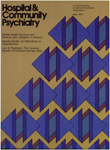Alternative to the Back Ward: The Quarterway House
Abstract
The Quarterway House was founded in December 1978 to deinstitutionalize and provide rehabilitation services to a small group of long-term, seriously ill inpatients of the Massachusetts Mental Health Center. The purposes of the residential program are to provide a less institutional therapeutic environment and to develop a psychosocial treatment program that might enable some patients to move toward more independent settings in the community. In a randomized experimental study, with center inpatients as the control group, the effectiveness of the program was assessed by multiple outcome measures before the program began and at one year. Although neither group moved rapidly to more independent community living, Quarterway House patients showed improvement in general functioning and socialization-survival skills and decreased medication and seclusion. They did not show a decline in psychotic symptoms, obstreperousness, or antisocial behavior. Over-all, the findings suggest the program may prove useful for the long-term rehabilitation of severely ill patients.
Access content
To read the fulltext, please use one of the options below to sign in or purchase access.- Personal login
- Institutional Login
- Sign in via OpenAthens
- Register for access
-
Please login/register if you wish to pair your device and check access availability.
Not a subscriber?
PsychiatryOnline subscription options offer access to the DSM-5 library, books, journals, CME, and patient resources. This all-in-one virtual library provides psychiatrists and mental health professionals with key resources for diagnosis, treatment, research, and professional development.
Need more help? PsychiatryOnline Customer Service may be reached by emailing [email protected] or by calling 800-368-5777 (in the U.S.) or 703-907-7322 (outside the U.S.).



